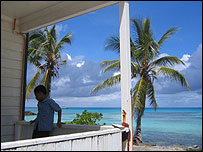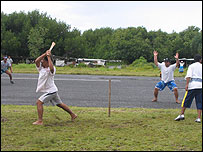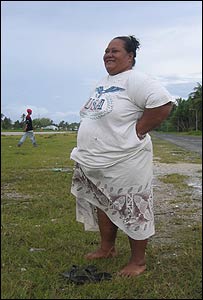The South Pacific country of Tuvalu is perhaps best known for its internet domain name - .tv - which it leases out for several million dollars a year. But who can blame them when, as Nick Squires explains, the tiny country's distinctive way of life is under threat because of climate change.
 |
 Almost everything about kilikiti would have cricket's guardians at Lord's spluttering into their gin and tonics.
Almost everything about kilikiti would have cricket's guardians at Lord's spluttering into their gin and tonics.

|
It's cricket, but not as we know it.
For a start the bat is long and shaped like a war club.
It has three sides, which means that the ball - made of wood and about the size of a golf ball - flies off in random directions, scattering pigs, dogs and children, and often ends up lost in long grass or among banana groves.
There is only one stump, not three, and the pitch is a muddy patch of grass beside an airport runway.
This is cricket South Pacific-style, a form of the game known as "kilikiti" which has strayed far from its British origins.
The word kilikiti is a Polynesian pronunciation of cricket.
The game is played in several South Pacific countries, including Tokelau, a tiny dependency of New Zealand, and Samoa, where it is known as "kirikiti".
But my introduction to kilikiti was in Tuvalu, a collection of nine coral atolls and islands which under British rule were one half of a colony known as the Gilbert and Ellice Islands.
Rising sea levels

Tuvalu won independence from the United Kingdom in 1978
|
You may have heard of Tuvalu in the context of global warming.
It could become the first country in the world to succumb to rising sea levels.
Not only is it tiny - 10 sq miles (26 sq km) in total - it is also very flat.
The highest point is barely 15ft (4.5m) above sea level and record high tides early this month led to widespread flooding.
I was in Tuvalu this week to report on the rising sea level issue and to see whether the country might become a 21st century Atlantis, visible in future only from a glass-bottomed boat.
But kilikiti also intrigued me, so I was excited to come across a couple of games during a five-day stay on the main island of Funafuti.
Although it contains Tuvalu's parliament, post office, bank and other important facilities, Funafuti is small.
Very small.
It is a mere ribbon of coral rubble, flanked on one side by the open ocean and on the other by an exquisite turquoise lagoon.
It is eight miles (13km) long but very narrow, at one point barely wider than a two-lane highway.
A long way from Lord's
You could spit - if you were so inclined - from one side to the other.

Between flights, Funafuti's runway hosts games of kilikiti
|
Because the island is so cramped (it is home to half of Tuvalu's 10,000 people) sport is played on the runway built by the Americans in the Second World War.
But given that there are only three flights a week - all from neighbouring Fiji - the chances of having a game interrupted by a descending plane are slim.
Almost everything about kilikiti would have cricket's guardians at Lord's spluttering into their gin and tonics.
Teams are mixed and can be any size - up to about 50 people.
Instead of whites, players wear colourful "lava lavas" - wraparound pieces of cloth - with garlands of tropical flowers around their heads.
Many are barefoot.
No cucumber sandwiches
And there are other curious innovations.
"If the batsman is a bit fat he can appoint a fitter man to run for him," Apelu Meneua, a 44-year-old boat captain, explained to me.
Sure enough, a bulky bloke I could see standing at the crease was flanked by a whippet-like younger man, poised to sprint once the ball was hit.
During one of the matches I watched, Polynesian pop music blared from a nearby bar - its walls painted bright pink - and a fielder puffed on a cheroot.
The score was kept on a scrap of cardboard by a young woman with a frangipani flower in her hair.
Needless to say, there were no pads, gloves or cucumber sandwiches.
Losing ground to football
For all its appealing eccentricities, it turns out there is a bit of a dark cloud hanging over kilikiti in Tuvalu.
The game is losing out to another imperial sporting legacy - football.

Tuvalu's main exports are copra and handicrafts
|
"Young people don't want to play kilikiti any more," the boat skipper told me. "It's not like the old times when chiefs were captains and the whole village would take part."
Ofulino Ekueta, a 25-year-old nurse, agreed.
"It's being played less and less," she said. "Nowadays the boys prefer football."
Sure enough, further down the runway numerous games of soccer were attracting a much larger crowd.
Hundreds of young men were running up and down the tarmac and practising shots at goal.
A 19-year-old student, Manoa Lito, told me he never played cricket because he found it "boring".
That seems a shame.
Football is pretty much the same wherever you go in the world, but kilikiti is cricket with a uniquely Polynesian twist.
Its future appears to be in some doubt, very much like Tuvalu itself.
Unless the world can reduce greenhouse gas emissions and global warming, Tuvaluans may not see out the century, at least not on their island home.
If that happens, it is not just kilikiti that will be lost to the waves.
From Our Own Correspondent was broadcast on Saturday, 1 April, 2006 at 1030 GMT / 1130 BST on BBC Radio 4. Please check the programme schedules for World Service transmission times.

